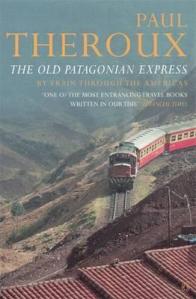Paul Theroux jumps into a Bostonian subway and, after the passage of many months, out of a train in Southern Chile. This work details the story of his trip in true Theroux style, cynical, matter-of-fact and with vivid imagery.
At the start I was intrigued about his travels though the USA, longing to also be on a train, going somewhere – anywhere -and really enjoyed his perceptions of fellow passages and passing stations. Mexico, too, was lovely – reminiscent of sultry nights, Spanish accents, the dark corners of alleyways and plenty cerveza. However, the USA and Mexico occupy hardly more than ten percent of these pages.
Much like Theroux himself I suspect, I became bogged down in the jungles of Central America where Guatemala, Nicaragua and El Salvador meld together into one jungly, poverty-stricken, dirty mess of inter-continental ‘Americaness’ (don’t blame me – I’ve never been. It’s with him you should be arguing!)
Although seemingly lovely to everyone he meets – although I’m doubtful he would tell us otherwise – Theroux’s cultural condescension and cynical snippiness becomes old (I can only imagine his bitchy asides at a cocktail party) – somewhere on a train in the mountains / in a tunnel / in a jungle / in a town in Central America. It doesn’t go away or get less irritating, but the scenery gets a little less monotonous (once you’ve become stuck in and extricated yourself from the Panamanian Canal crisis),as he journeys through the north of South America and enters Argentina.
His time spent with Jorge Louis Borges, the famed blind Argentine author harks of kindred spirits – the brilliant, but narcissistic artist at the feet and bidding of another – as they read, listen, judge and comment on work of their predecessors. And finally, after leaving Buenos Aires, the journey trails off into the middle of a Chilean desert, where Theroux leaves his train journey, and this book, at an end.
At times, when Theroux is in the throes of some mosquito-induced melancholy (and to be fair, there was a large part of his trip that despite a lack of budget constraint wasn’t very comfortable at all, although one could argue for any volunteered travel being a luxury) he becomes a tad self-righteous. He portentously protests “I did not take any pleasure in suffering the torments of travel merely so that I could dine out of them…” and mentions how although he’d rather travel with his wife, one travels and writes best in solitude. True perhaps, but also possibly what she tells him when she’d like him out of the way for a while. “Yes, darling. You take one for the team”.
That said, there are isolated passages so startling in their clarity and beauty that they force the reader (okay, me) to stop, re-read them and marvel at their genius. Just enough, in fact, to keep one reading right until the very last page. Here are a few to whet your wanderlust:
- “Travel is a vanishing act, a solitary trip down a pinched line of geography to oblivion… But a travel book is the opposite, the loner bouncing back bigger than life to tell the story of his experiment with space. It is the simplest sort of narrative, and explanation which is its own excuse for the gathering up and the going. It is motion given order by its repetition in words”.
- “Half of jazz is railway music, and the motion and noise of the train itself has the rhythm of jazz… Musicians traveled by train or not at all, and the pumping tempo and the clickety-clack and the lonesome whistle crept into the songs”.
- “Moments later, it was dawn. No bulb of sun but a seepage of light that dissolved the darkness and rose on all sides bringing a bluer ozone-scented softness to a sky which became gigantic”.
